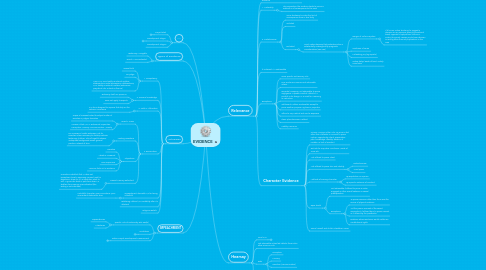
1. ----
1.1. Project-Start
1.1.1. Project specifications
1.1.2. End User requirements
1.1.3. Action points sign-off
1.2. Development Stage 1
1.2.1. Define actions as necessary
1.3. Development Stage 2
2. Types of Evidence
2.1. Testimony v. Tangible
2.2. Direct v. Circumstantial
3. Witnesses
3.1. 1. Competency
3.1.1. Insane/child
3.1.2. No judge
3.1.3. Juror MAY NOT testify re internal matters, statements or metal processes in deliberations; MAY testify re external matters (extraneous prejudicial info, outside influence)
3.2. 2. Personal Knowledge
3.2.1. Testimony itself can prove PK
3.2.2. Does not apply to experts
3.3. 3. Oath or Affirmation
3.3.1. in a form designed to impress that duty on the witness' conscience
3.4. 4. Examination
3.4.1. Direct v. Cross
3.4.1.1. Scope of CrossEx limited to subject matter of DirectEx or judge's discretion
3.4.1.2. CrossEx Attack W's 4 Testimonial Capacities: Perception, Memory, Communication, Veracity
3.4.2. Leading Questions
3.4.2.1. For CrossEx or hostile witnesses; not for DirectEx unless necessary to develop witness testimony, children, infirm/forgetful witness, undisputed background issues, general points in interest of time
3.4.3. Objections
3.4.3.1. Narrative
3.4.3.2. Asked & Answered
3.4.3.3. Non-responsive
3.4.3.4. Assumes facts not in evidence
3.4.4. Present Memory Refreshed
3.4.4.1. Procedure: Establish that W does not remember, show to opposing counsel, wait for objections, Show to W, W reads doc silent to self, W gives doc back or puts face down, W testifies from memory now refreshed (the writing is not admitted)
3.5. Impeachment: discredit a W for being untruthful
3.5.1. Untruthful character, prior convictions, prior inconsistent statements, bias
3.6. Bolstering: defend W's credibility after it's attacked
3.7. Religious Beliefs
4. IMPEACHMENT
4.1. Specific Acts of Dishonesty Rule 608(b)
4.1.1. Dependencies
4.1.2. Milestones
4.2. Limitations
4.2.1. Schedule
4.2.2. Budget
4.3. Define Project Development Measurement
4.3.1. KPI's
5. Relevance
5.1. Materiality and Probativeness. Any tendency to make a fact of consequence more or less probable than it would be w/out the evidence
5.2. 1. Materiality
5.2.1. The proposition the evidence tends to prove is material or of consequence to the case
5.3. 2. Probativeness
5.3.1. Some tendency to make the fact of consequence more or less likely
5.3.2. Included
5.3.3. Excluded
5.3.3.1. Court makes decision that probative value is substantially outweighed by pragmatic considerations (FRE 403)
5.3.3.1.1. Danger of Unfair Prejudice
5.3.3.1.2. Confusion of Issues
5.3.3.1.3. Misleading jury (eg experts)
5.3.3.1.4. Undue delay/ waste of time/ unduly cumulative
5.4. if irrelevant => inadmissible
5.5. Exceptions
5.5.1. some specific exclusionary rule
5.5.2. Prior similar occurrences not admissible unless...
5.5.3. Remedial Measures: not admissible to prove negligence, culpable conduct, defect in a product or its design, or a need for a warning or instruction
5.5.4. Settlement Matters inadmissible except to prove another purpose, eg bias or prejudice
5.5.5. Offers to Pay Medical and Similar Expenses
5.5.6. Pleas, plea discussion, related
5.5.7. Liability Insurance
5.6. Character Evidence
5.6.1. Crimes, Wrongs, Other Acts: To prove a fact other than character, in criminal to prove motive, opportunity, intent, preparation, plan, knowledge, identity, absence of mistake, or lack of accident
5.6.2. Exclude for Prejudice, Confusion, Waste of Time, etc.
5.6.3. Acts offered to prove Intent
5.6.4. Acts offered to prove Plan and Identity
5.6.4.1. Distinctiveness
5.6.4.2. Time/Space
5.6.5. Methods of Proving Character
5.6.5.1. By Reputation or Opinion
5.6.5.2. By Specific Instances of Conduct
5.6.6. Rape Shield
5.6.6.1. Not admissible if offered to prove a victim engaged in other sexual behavior or sexual predisposition
5.6.6.2. Exceptions
5.6.6.2.1. To prove someone other than the D was the source of physical evidence
5.6.6.2.2. Wrt the person accused of the sexual misconduct, if offered by D to prove consent or if offered by the prosecutor
5.6.6.2.3. Evidence whose exclusion would violate D’s constitutional rights
5.6.7. Sexual Assault and Child Molestation Cases
6. Hearsay
6.1. OCS/TMA
6.1.1. Materials
6.1.2. Personel
6.1.3. Services
6.1.4. Duration
6.2. Not admissible unless fed statute, these rules other SCOTUS rule
6.3. Risks
6.3.1. Perception
6.3.2. Memory
6.3.3. Narration (communication)
6.3.4. Sincerity (veracity)
